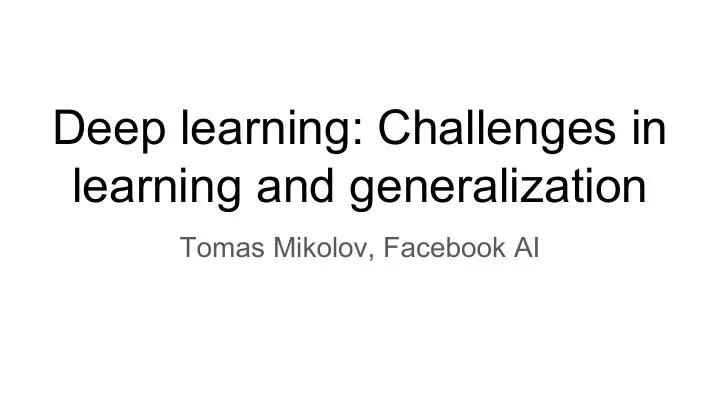

Deep learning: Challenges in learning and generalization Tomas Mikolov, Facebook AI
What is generalization? Memorization ● to remember all training examples (Universal Approximator) ● 2 + 3 = 5, 3 + 2 = 5, ... Generalization ● to infer novel conclusions ● 123 + 234 = 357, ...
How much do deep neural networks generalize? ● Often less than we would expect (or hope) ● It is easy to make wrong conclusions when using deep networks without understanding how they work ● In this talk: examples of limits of learning in recurrent neural networks
Language Modeling for strong AI ● Language models assign probability to sentences ● P(“Capital city of Czech is Prague”) > P(“Capital city of Czech is Barcelona”) AI-complete problem: ● A bit of progress in language modeling , Joshua Goodman 2001 ● Hutter prize compression challenge
AI-completeness of language modeling We could build intelligent question answering systems and chatbots using perfect language models: ● P(“Is the value of of Pi larger than 3.14? Yes.”) > P(“Is the value of of Pi larger than 3.14? No.”) Language models can generate novel text: ● better language models generate significantly better text (RNNLM, 2010)
Recurrent neural language models ● Breakthrough after 30 years of dominance of n-grams ● The bigger, the better! ○ This continues to be the mainstream even today ● Can this lead to AGI? Strategies for training large scale neural network language models, Mikolov et al, 2011
End-to-end Machine Translation with RNNLM (2012) Simple idea - create a training set from pairs of sentences in different languages: 1. Today it is Sunday. Hoy es domingo. It was sunny yesterday. Ayer estaba soleado. … 2. Train RNNLM 3. Generate continuation of text given only the English sentence: translation!
End-to-end Machine Translation with RNNLM (2012) ● Problem: the performance drops for long sentences ● Even worse: cannot learn identity! ○ Today it is Sunday. Today it is Sunday. It was sunny yesterday. It was sunny yesterday. … ○ Can perfectly memorize training examples, but fails when test data contain longer sequences
Towards RNNs that learn algorithms ● RNNs trained with stochastic gradient descent usually do not learn algorithms ○ just memorize training examples ○ does not matter how many hidden layers we use, and how big the hidden layers are ● This does not have to be a serious problem for applied machine learning ○ memorization is often just fine ● A critical issue for achieving strong AI / AGI
Stack-augmented RNN Inferring algorithmic patterns with stack-augmented recurrent nets, Joulin & Mikolov, 2015
Generalization in RNNs
Binary addition learned with no supervision
Future research - algorithmic transfer learning ● current machine learning models are usually bad at high-level transfer learning ● the “solution” that is learned is often closer to look up table than minimum description length solution ● teaching an RNN to solve a slightly more complex version of already solved task thus mostly fails A roadmap towards machine intelligence, Mikolov et al, 2015
Future research - different approach to learning ● we need much less supervision ● probably no SGD, no convergence (learning never ends) ● maybe more fundamental (basic) model than RNN? ○ are memory, learning, tasks, rewards etc. just emergent properties in a more general system?
Recommend
More recommend